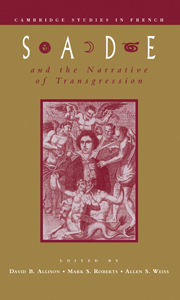Book contents
- Frontmatter
- Contents
- List of contributors
- Acknowledgments
- Introduction
- 1 The use value of D. A. F. Sade (An open letter to my current comrades)
- 2 Sade, or the philosopher–villain
- 3 Libidinal economy in Sade and Klossowski
- 4 A political minimalist
- 5 The Society of the Friends of Crime
- 6 Sade, mothers, and other women
- 7 The encyclopedia of excess
- 8 “Sex,” or, the misfortunes of literature
- 9 Structures of exchange, acts of transgression
- 10 Gender and narrative possibilities
- 11 Sade's literary space
- 12 Fantasizing Juliette
- Select bibliography
- Index
- Cambridge Studies in French
4 - A political minimalist
Published online by Cambridge University Press: 21 August 2009
- Frontmatter
- Contents
- List of contributors
- Acknowledgments
- Introduction
- 1 The use value of D. A. F. Sade (An open letter to my current comrades)
- 2 Sade, or the philosopher–villain
- 3 Libidinal economy in Sade and Klossowski
- 4 A political minimalist
- 5 The Society of the Friends of Crime
- 6 Sade, mothers, and other women
- 7 The encyclopedia of excess
- 8 “Sex,” or, the misfortunes of literature
- 9 Structures of exchange, acts of transgression
- 10 Gender and narrative possibilities
- 11 Sade's literary space
- 12 Fantasizing Juliette
- Select bibliography
- Index
- Cambridge Studies in French
Summary
There is perhaps no question concerning Sade more difficult to address than that of his political thought. He has been the subject of the most contradictory interpretations in many domains (such as the ethical and the philosophical). But it is in the face of the exasperating enigma of his politics that the number of conflicting interpretations reaches a peak. An anachronistic, or indeed untimely, contemporary of the Enlightenment, a protagonist of the French Revolution often despite himself, Sade has provided his critics with a set of paradoxical political declarations which seem to conspire to undermine all the premises generally admitted by those, from Aristotle to Rousseau, who tried to think “politically”. But were they not all, in Juliette's terms, just “ordinary philosophers”?
The portfolio of ideological labels attached to Sade by his commentators, hagiographers or detractors is large, and so contradictory that it may be asked whether this ubiquitous Marquis, sometimes terrorist and sometimes counter–revolutionary, here a bolshevik and there a conservative, is one and the same character. In spite of their unanimous moral prejudices against him, nineteenth–century authors were immediately divided when dealing with Sade's relationship to revolutionary events. Jules Janin, the conservative literary critic, and Jules Michelet, the progressive historian, offer an almost comical contrast. Janin deems it natural to link Sade with Robespierre: “Oh, what a worthy couple, Sade and Robespierre …”.
- Type
- Chapter
- Information
- Sade and the Narrative of Transgression , pp. 76 - 99Publisher: Cambridge University PressPrint publication year: 1995



